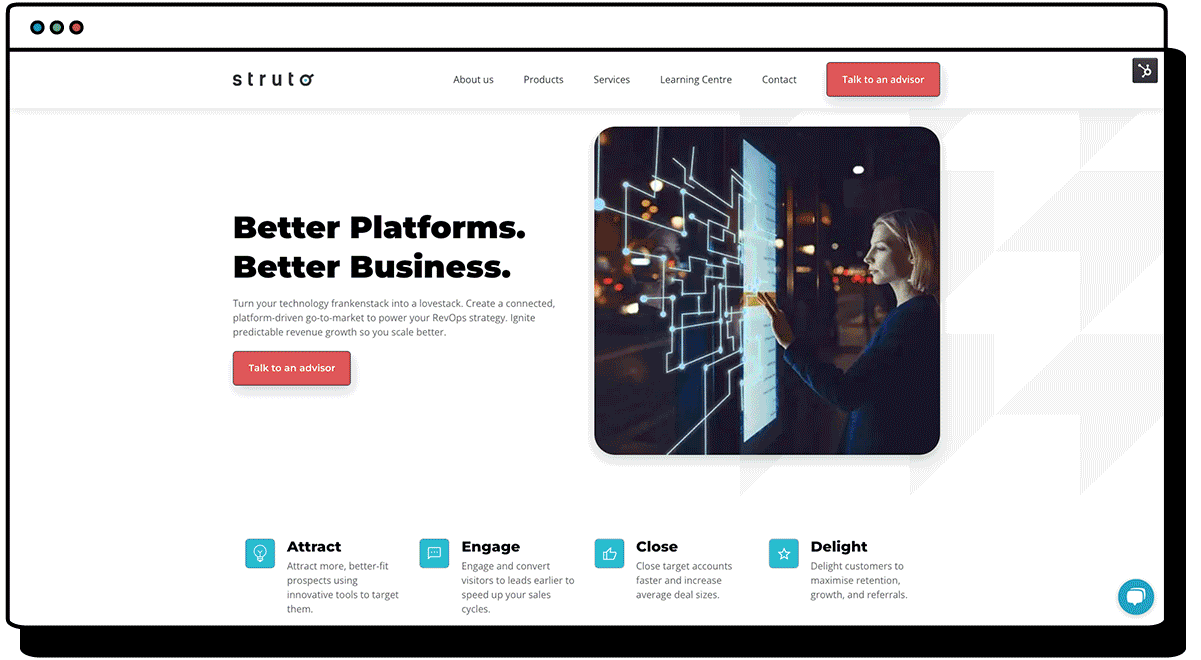The importance of a well-structured, engaging website cannot be overstated. It's the digital storefront to your business, the first interaction that many will have with your brand and as HubSpot specialists, we've seen firsthand how the right tools and strategies can transform this digital presence into a powerful asset.
This is your comprehensive resource for everything related to HubSpot websites. Whether you're looking to build one from scratch, aiming to enhance your existing site, or looking to take it to the next level by leveraging advanced features for growth, we cover it all here to ensure your online success. So, without further ado, let's dive into the world of HubSpot websites.
 Building Your HubSpot Website
Building Your HubSpot Website
Building your HubSpot website is an exciting journey that blends strategy and creativity. It's about more than just putting digital bricks together; it's about crafting an online experience that resonates with your audience and drives your business goals forward. Let's break down the key components to consider when creating your HubSpot website.
Website Strategy
Every successful website starts with a solid strategy. Before diving into design and development, it's crucial to understand your goals, target audience, and how your HubSpot website fits into your broader digital marketing plan. Crafting a clear path forward ensures that your site not only looks good but performs well, too. A strategic approach shapes the success of your digital marketing efforts and sets the foundation for your online presence. Learn more about website strategy.

Design Approaches
When it comes to designing your website, Struto offers flexibility whether you prefer a templated, hybrid, or custom design. Each approach has its merits, depending on your needs, budget, and timeline. Templated designs offer speed and efficiency, the hybrid approach is a balance of customisation and convenience, and the custom method involves designing a fully tailored solution bespoke for your business. The key is choosing the one that best aligns with your strategic goals. Explore the three main approaches to building your website.
HubSpot has an AI website builder, using artificial intelligence to help build a single page website. Whilst this simplifies the process and enables users to build their own site, the functionality is extremely limited, and if you require more than one page, this won’t be a suitable option.
Sandboxes
Using sandboxes for development and testing is a smart move. It allows you and your team to experiment and make changes in a replicated environment of your website without affecting your live site. This safe environment encourages innovation and troubleshooting, ensuring that any major updates or integrations are tested and polished before going public. Find out how developers use sandboxes to save websites from costly mistakes.

Website Pricing
Investing in a quality website is a strategic move that contributes to a significant ROI by enhancing your brand, attracting more customers, and fostering business growth. However, when faced with the challenge of building the best website to suit your business, the million-dollar question is: “How much does a website cost?”
Several core factors influence the price of a website, including; design, functionality, customisation, size and integration. Learn more as we unpack the cost implications and discuss the factors that will influence your HubSpot website development budget.

HubSpot vs WordPress
Choosing the right content management system (CMS) is a crucial choice when planning your company website. Both HubSpot and WordPress offer clear-cut advantages and cater to different types of businesses. Join us as we explore the importance of choosing the right website platform by juxtaposing two juggernauts in today's website market: HubSpot versus WordPress.

To Summarise
Building a HubSpot website is about embracing a comprehensive approach that marries strategy, design, technology, and user experience. By focusing on these core areas, you're setting up your online presence for success from the start. Remember, your website is an evolving entity that reflects your brand's journey. With HubSpot's powerful tools and strategic framework, you're well-equipped to create a website that not only meets but exceeds your digital marketing objectives.
 Managing Your HubSpot Website
Managing Your HubSpot Website
Once your HubSpot website is live, the journey shifts from building to management. This phase is critical for ensuring your site remains vibrant, engaging, and aligned with your evolving business goals. Let's delve into key aspects of managing your HubSpot website efficiently and effectively.
No Coding? No Problem!
One of the strengths of HubSpot’s platform is its user-friendly interface that empowers you to manage your website without any coding knowledge. From updating content to modifying design elements, HubSpot’s CMS is designed for ease of use, ensuring that you can keep your site fresh and relevant. Delve into managing a HubSpot website without coding expertise.
Website Migrations and E-commerce
Integrating e-commerce platforms with your HubSpot website can transform your online presence into a robust sales engine. Whether you're migrating an existing site to HubSpot or looking to enhance your e-commerce capabilities, HubSpot's seamless integrations ensure a smooth transition and a powerful platform for growth. Explore the value of integrating e-commerce platforms with HubSpot CMS.

Security and Compliance
In an era where website security and compliance cannot be overlooked, HubSpot provides robust tools and practices to keep your site safe and compliant. From hosting security to data protection regulations, managing these aspects is crucial for maintaining trust with your visitors. Learn about ensuring website safety, hosting compliance, and security best practices.

To Summarise
Effectively managing your HubSpot website is about leveraging the platform's extensive tools and features to maintain and enhance your online presence. Whether it's through seamless content updates, integrating e-commerce functionalities, or ensuring top-notch security and compliance standards, HubSpot equips you with everything you need for a dynamic and successful website. Remember, a well-managed website reflects the vitality and commitment of your brand to your audience.

 Optimising Your HubSpot Website
Optimising Your HubSpot Website
Optimising your HubSpot website is a continuous process that focuses on improving user experience (UX), leveraging analytics for insights, and adopting growth-driven design principles. This phase ensures your site not only attracts visitors but also converts them into loyal customers.
UX Best Practices
Implementing UX best practices is key to creating a seamless and engaging user experience. From the overall design to the smallest interaction, every element should aim to enhance usability and satisfaction using human intuition and logic. Delve into mastering UX best practices and explore principles for simplifying your website designs to keep users coming back.

Website Analytics
Website analytics allow you to understand how visitors interact with your site, providing invaluable insights for optimisation. By analysing user behaviour, you can make data-driven decisions to improve UX and drive better results. Learn how to optimise UX and drive results with website analytics.

Growth-Driven Design
Growth-driven design (GDD) is a dynamic approach to web design that prioritises flexibility and optimising your website over time, using understanding gained from evaluating your website’s performance after its launch. Instead of one-time overhauls, GDD focuses on continuous improvements based on user data and feedback, ensuring your website evolves with your audience's needs. Explore the key to sustainable website success with growth-driven design.
Download our comprehensive eBook, Iterate and Thrive: A Guide to GDD for Modern Websites, which offers you a look at GDD in detail.

To Summarise
Optimising your HubSpot website is about refining and evolving your online presence to meet and exceed user expectations. Through diligent application of UX best practices, data analysis, and embracing a growth-driven design philosophy, your website can become a powerful tool in achieving your business objectives.

Case Study Highlights
9ine
The 9ine case study showcases a successful hybrid website project executed on HubSpot, blending the best of templated efficiency with custom design flexibility. This approach not only streamlined the development process but also significantly enhanced the site's performance and user engagement.
The case study is a testament to the power of strategic design and development in achieving business goals, illustrating how a well-executed website can become a pivotal asset in a company's digital marketing strategy, enabling a business to tell its story. For an in-depth look at the project and its outcomes, visit the 9ine case study.

Allpack
The Allpack website project is a prime example of templated website design. Allpack partnered with Struto to develop a cutting-edge templated website. Focused on user experience (UX), this digital overhaul has bolstered their brand presence, delivering an appealing and intuitive online platform that optimally supports their business objectives. This case study unpacks Allpacks’ requirements and how Struto’s website template pack met their needs, empowering their team to take ownership of the website in-house.

Conclusion
Embarking on the journey of building, managing, and optimising a HubSpot website can seem daunting at first, but it's a pathway paved with opportunities for growth, engagement, and conversion. From establishing a robust strategy to adopting a design that speaks to your audience, from managing your site with ease to continuously optimising for better results, every step is crucial.
Remember, your website is more than a digital storefront; it's the heart of your online presence, a dynamic tool that evolves with your business. Embrace the journey, leverage the power of HubSpot, and watch as your digital presence transforms into your most valuable asset.



